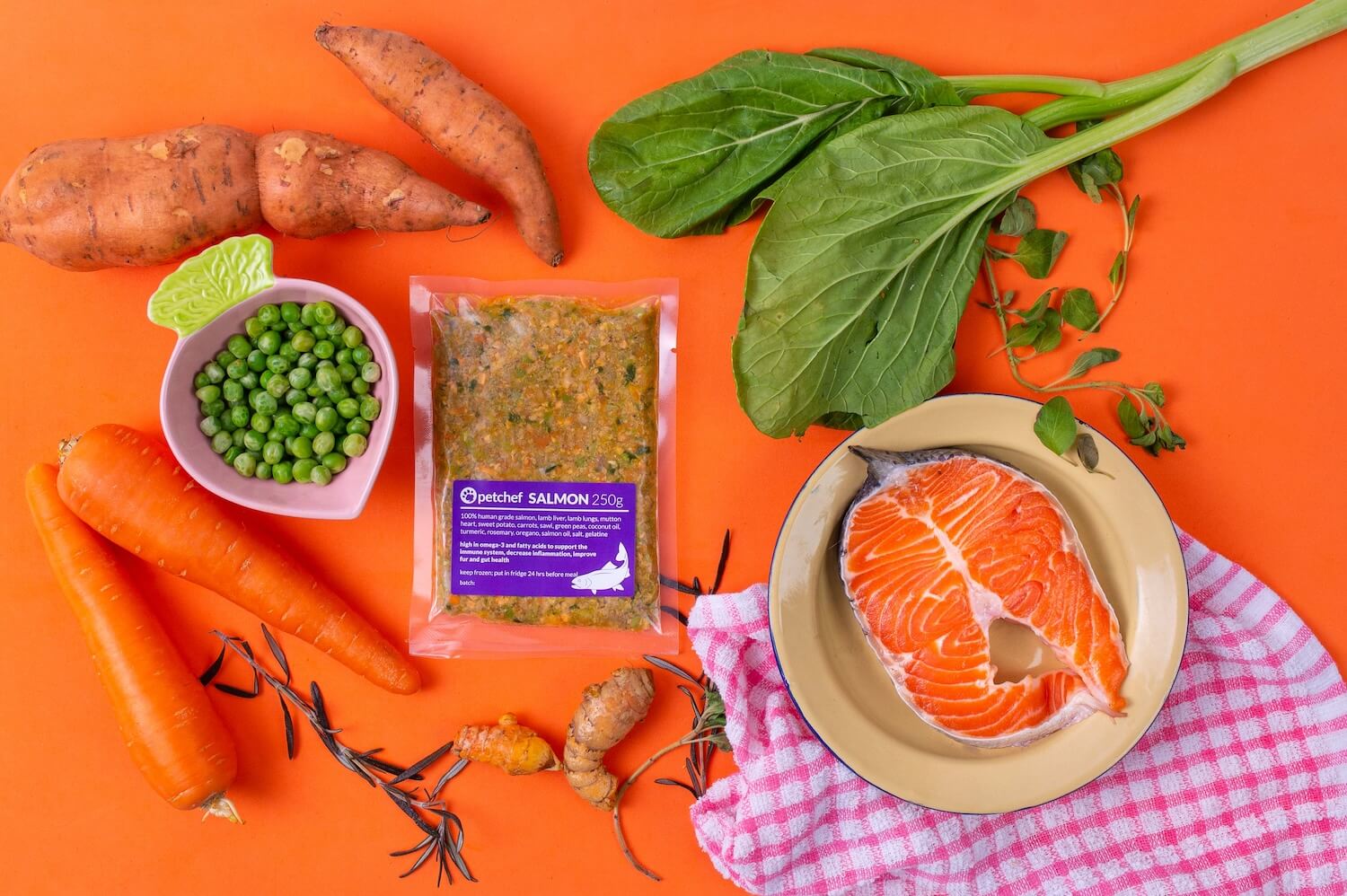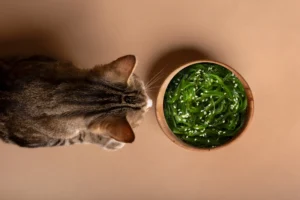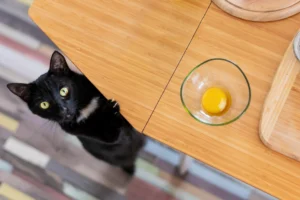If you’re a pet parent, you’ll be all too familiar with having kitten eyes staring into your soul or a mysterious paw swiping at your food as you try and enjoy your meal/snack. And as we would love to share our favourite things and experiences with our pets, we’re often left wondering, “can my cat eat this?”, “how much can they have?”, “what can I give as a substitute?”
In this listicle, we’ll tell you whether they can or cannot and the why to the most common human foods our cats will beg or try to sneak a bite of.
PS: YES means they’re safe to eat in moderation/small amounts, NO means avoid feeding at all cost and look out for warning signs if they have snuck a nibble.
Table of Contents
Can cats eat chocolate?
- Answer: NO
Why: Chocolate contains theobromine and caffeine, which are toxic to cats and can cause symptoms like vomiting, diarrhoea, rapid breathing, and even seizures. Keep chocolate and chocolate-containing foods out of reach of your feline friend.
Monitor Symptoms: Watch for signs of chocolate poisoning, including vomiting, diarrhoea, rapid breathing, or restlessness.
Induce Vomiting: Only induce vomiting if instructed by a vet; they may recommend a safe method or medication.
Provide Information: Be ready to provide details like the type and amount of chocolate consumed, and your cat's weight.
Can cats eat bread?
- Answer: YES, but it's pointless..
Why: Cats can eat small amounts of plain bread without harmful effects, but it offers little nutritional value. Avoid giving them bread with added ingredients like garlic, onions, or raisins, which are toxic to cats. Bread should only be an occasional treat and not a regular part of their diet.
Can cats eat watermelon?
- Answer: YES
Why: Some cats may enjoy the taste and texture of watermelon, especially since it’s juicy and hydrating. However, not all cats will be interested in fruit. It’s best to offer a small piece (without rind and seed) and see if your cat likes it. If they do, watermelon can be a refreshing treat in moderation, as an occasional treat and not a regular part of their diet.
Can cats eat cheese?
- Answer: YES
Why: Cats can eat small amounts of cheese, but it should be given sparingly. Cheese is not toxic to cats, but many cats are lactose intolerant, which means they might have difficulty digesting dairy products. Consuming cheese can lead to digestive upset, including diarrhoea or stomach discomfort. If you want to offer cheese as a treat, choose a small amount and observe your cat for any adverse reactions.
Can cats eat bananas?
- Answer: YES
Why: Cats’ reactions to bananas can vary. Some cats might be curious and nibble on a small piece, while others may show little interest. Bananas have a strong smell and texture that may not appeal to all cats. Bananas are not toxic to cats and can be a safe treat in small amounts. They provide some vitamins and fibre, but cats don’t need fruit in their diet. Make sure to offer only a small piece, and avoid giving them bananas with added sugars or other ingredients.
Can cats eat eggs?
- Answer: YES
Why: Cats can eat eggs, but they should be cooked. Raw eggs can carry the risk of salmonella or E. coli and may interfere with nutrient absorption due to a protein called avidin. Cooked eggs, such as scrambled or boiled, can be a safe and nutritious treat, providing protein and essential nutrients. Ensure the eggs are fully cooked and served in small amounts to avoid digestive issues.
Can cats eat rice?
- Answer: YES
Why: Cats can eat rice in small amounts. It’s not toxic and can be a bland, easily digestible option if your cat has an upset stomach. However, rice doesn’t offer much nutritional value for cats, so it should only be an occasional treat and not a regular part of their diet. Make sure it’s plain, without any added seasonings or ingredients.
Can cats eat durian?
- Answer: NO
Why: Cats should not eat durian. Durian is not toxic to cats, but it’s not suitable for them due to its strong odor, high fat content, and potential digestive issues. Additionally, its large seeds could pose a choking hazard or cause gastrointestinal problems. It’s best to avoid giving durian and stick to safe, cat-friendly treats.
Can cats eat corn?
- Answer: YES
Why: Cats can eat corn in small amounts, but it’s not particularly beneficial for them. While it’s not toxic, corn is not a natural part of a cat’s diet and offers little nutritional value. If you do offer corn, make sure it’s cooked and plain, without any added butter, salt, or seasoning. However, it’s better to stick to treats and foods specifically formulated for cats for their optimal health.
Can cats eat mango?
- Answer: YES
Why: Cats can eat mango in small amounts. Mango is not toxic to cats and can be a safe treat as long as you remove the pit and skin, which can be difficult for cats to digest. Mango provides some vitamins and fiber, but it should only be given occasionally and in small pieces. Always observe your cat for any adverse reactions when introducing new foods.
Can cats eat yoghurt?
- Answer: YES
Why: Cats can eat yogurt in small amounts, but it should be plain and free of added sugars or artificial sweeteners. Many cats are lactose intolerant, so yogurt might cause digestive upset, including diarrhea or stomach discomfort. If you want to give yogurt as a treat, offer only a small amount and monitor your cat for any negative reactions. It’s best to choose yogurt with live cultures, as these can be easier for cats to digest.
Frequently asked questions
What are some 100% cat safe treats?
Cooked Meat
Small pieces of cooked chicken, turkey, or beef are protein-rich and more suited to a cat’s diet.
Cat Treats
Specially formulated cat treats come in various flavours and are designed to be both safe and appealing.
Freeze-Dried Treats
Freeze-dried meat treats can be a crunchy and nutritious alternative.
Catnip or Cat Grass
Safe and enjoyable for many cats, these can offer enrichment without adding calories.
What to do if my cat ate something poisonous?
- Contact a Veterinarian
Call your vet or an emergency animal clinic right away for guidance on what to do next. - Provide Details
Be ready to give information about what your cat ate, how much, and when it occurred. - Induce Vomiting
Only induce vomiting if instructed by a vet; they can provide the safest method. - Monitor Symptoms
Watch for signs of poisoning, such as vomiting, diarrhoea, lethargy, or difficulty breathing. - Keep Calm
Remain calm and follow the vet’s advice carefully to ensure your cat gets the appropriate care.





















